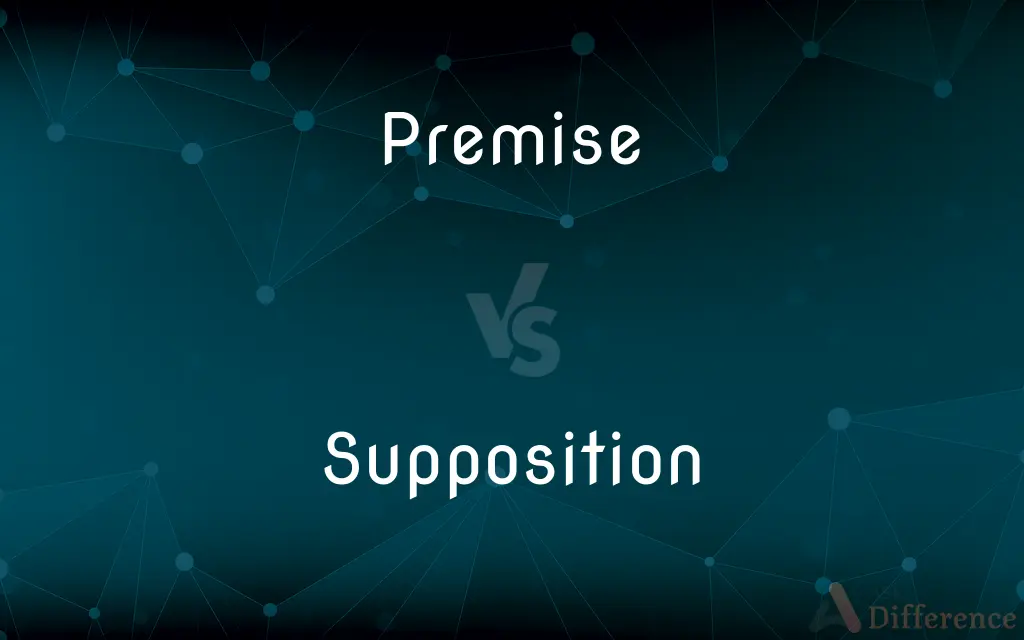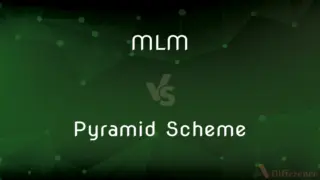Premise vs. Supposition — What's the Difference?
By Tayyaba Rehman & Urooj Arif — Published on February 2, 2024
A premise is a statement used as the basis for an argument or theory, while a supposition is an uncertain belief or assumption without firm evidence.

Difference Between Premise and Supposition
Table of Contents
ADVERTISEMENT
Key Differences
A premise is a foundational statement or proposition that forms the basis for an argument or conclusion. It is often used in logic and reasoning as a starting point that is accepted as true. In contrast, a supposition is an assumption or hypothesis that is not based on known facts or evidence but is taken for granted for the sake of argument or further investigation.
In logical arguments, the premise serves as the groundwork from which conclusions are drawn. It is considered a necessary element in constructing a rational argument. On the other hand, a supposition is more speculative in nature and often used as a tentative idea or hypothesis that needs to be tested or verified.
The validity of an argument largely depends on the soundness of its premises. They are statements that are presumed true and used to support a conclusion. Suppositions, however, are less about truth and more about possibilities, often used in theoretical or hypothetical scenarios without immediate concern for factual accuracy.
Premises are crucial in both deductive and inductive reasoning, providing the factual basis or the starting points for reasoning. Suppositions, in contrast, are often employed in scenarios where information is incomplete, serving as a provisional idea pending further evidence or analysis.
In summary, a premise is a fundamental element in logical and reasoned arguments, often accepted as true, while a supposition is more of an uncertain belief or assumption, used when there is a lack of concrete evidence.
ADVERTISEMENT
Comparison Chart
Definition
A foundational statement in logic and reasoning.
An uncertain assumption or hypothesis.
Role in Argument
Serves as the basis for conclusions.
Used to propose a theory or scenario for examination.
Basis
Often accepted as true or reasonable.
Not necessarily based on known facts or evidence.
Use in Reasoning
Essential in deductive and inductive reasoning.
Common in hypothetical or theoretical discussions.
Requirement for Evidence
Generally requires some form of validation.
May not require immediate evidence for consideration.
Compare with Definitions
Premise
A statement or idea that forms the basis for a logical argument.
The premise that all humans are mortal is fundamental to many philosophical arguments.
Supposition
A hypothesis assumed for the sake of argument.
The experiment began with the supposition that the drug would have no side effects.
Premise
A presupposition in a logical sequence.
The debate was based on the premise that economic growth leads to social progress.
Supposition
An idea or theory that is not proven but is used as a basis for reasoning.
Her novel's plot hinges on the supposition of a parallel universe.
Premise
A proposition upon which an argument is based or from which a conclusion is drawn.
Supposition
A tentative assumption made to draw out its logical or empirical consequences.
The research was guided by the supposition that genetic factors influence behavior.
Premise
One of the propositions in a deductive argument.
Supposition
An uncertain belief or assumption made without proof.
His theory was based on the supposition that the universe is infinite.
Premise
Either the major or the minor proposition of a syllogism, from which the conclusion is drawn.
Supposition
The act of supposing.
Premise
Land, the buildings on it, or both the land and the buildings on it.
Supposition
Something supposed; an assumption.
Premise
A building or particular portion of a building.
Supposition
Something that is supposed; an assumption made to account for known facts, conjecture.
Premise
(Law) The part of a deed that states the details of the conveyance of the property.
Supposition
The act or an instance of supposing.
Premise
To provide a basis for; base
"The American Revolution had been premised on a tacit bargain that regional conflicts would be subordinated to the need for unity among the states" (Ron Chernow).
Supposition
The act of supposing, laying down, imagining, or considering as true or existing, what is known not to be true, or what is not proved.
Premise
To state or assume as a proposition in an argument.
Supposition
That which is supposed; hypothesis; conjecture; surmise; opinion or belief without sufficient evidence.
This is only an infallibility upon supposition that if a thing be true, it is imposible to be false.
He means are in supposition.
Premise
To state in advance as an introduction or explanation.
Supposition
A message expressing an opinion based on incomplete evidence
Premise
A proposition antecedently supposed or proved; something previously stated or assumed as the basis of further argument; a condition; a supposition.
Supposition
A hypothesis that is taken for granted;
Any society is built upon certain assumptions
Premise
(logic) Any of the first propositions of a syllogism, from which the conclusion is deduced.
Supposition
The cognitive process of supposing
Premise
Matters previously stated or set forth; especially, that part in the beginning of a deed, the office of which is to express the grantor and grantee, and the land or thing granted or conveyed, and all that precedes the habendum; the thing demised or granted.
Supposition
An assumption or hypothesis, especially one considered to be provisional.
The detective's case was built on the supposition that the suspect was lying.
Premise
A piece of real estate; a building and its adjuncts.
Trespass on another’s premises
Premise
(authorship) The fundamental concept that drives the plot of a film or other story.
Premise
To state or assume something as a proposition to an argument.
Premise
To make a premise.
Premise
To set forth beforehand, or as introductory to the main subject; to offer previously, as something to explain or aid in understanding what follows.
Premise
To send before the time, or beforehand; hence, to cause to be before something else; to employ previously.
Premise
A proposition antecedently supposed or proved; something previously stated or assumed as the basis of further argument; a condition; a supposition.
The premises observed,Thy will by my performance shall be served.
Premise
Either of the first two propositions of a syllogism, from which the conclusion is drawn.
While the premises stand firm, it is impossible to shake the conclusion.
Premise
Matters previously stated or set forth; esp., that part in the beginning of a deed, the office of which is to express the grantor and grantee, and the land or thing granted or conveyed, and all that precedes the habendum; the thing demised or granted.
Premise
A piece of real estate; a building and its adjuncts; as, to lease premises; to trespass on another's premises.
Premise
To send before the time, or beforehand; hence, to cause to be before something else; to employ previously.
The premised flames of the last day.
If venesection and a cathartic be premised.
Premise
To set forth beforehand, or as introductory to the main subject; to offer previously, as something to explain or aid in understanding what follows; especially, to lay down premises or first propositions, on which rest the subsequent reasonings.
I premise these particulars that the reader may know that I enter upon it as a very ungrateful task.
Premise
To make a premise; to set forth something as a premise.
Premise
A statement that is assumed to be true and from which a conclusion can be drawn;
On the assumption that he has been injured we can infer that he will not to play
Premise
Set forth beforehand, often as an explanation;
He premised these remarks so that his readers might understand
Premise
Furnish with a preface or introduction;
She always precedes her lectures with a joke
He prefaced his lecture with a critical remark about the institution
Premise
Take something as preexisting and given
Premise
An initial proposition from which a conclusion is drawn.
His argument's premise was that climate change is accelerated by human activities.
Premise
The foundation or starting point of a theory or argument.
The entire theory rests on the premise that the market is inherently efficient.
Premise
A basic statement that supports a conclusion.
Her speech began with the premise that education is a fundamental right.
Common Curiosities
How is a supposition used in scientific research?
In scientific research, a supposition is often a starting hypothesis that guides experimentation.
Are premises always true?
Premises are not always true but are accepted as true within the context of the argument.
Is a supposition the same as a hypothesis?
A supposition is similar to a hypothesis but is often less formal and more speculative.
Can a supposition be proven true?
A supposition can potentially be proven true, but it starts as an unverified assumption.
How many premises does an argument need?
An argument can have one or more premises, depending on its complexity.
Can a premise be questioned?
Yes, the validity of a premise can and often should be questioned in critical thinking.
What is a premise in logic?
In logic, a premise is a statement or proposition that is an argument's starting point.
Is a supposition always uncertain?
A supposition typically starts as uncertain but can be investigated for validity.
Are suppositions important in hypothesis testing?
Yes, suppositions are important in formulating hypotheses for testing.
Can a supposition lead to a new discovery?
Yes, a supposition can lead to new discoveries, especially when it prompts further investigation.
Do all arguments have premises?
Yes, all logical arguments are based on at least one premise.
Are suppositions always part of theoretical discussions?
Suppositions are common in theoretical discussions but can be part of practical reasoning too.
Can premises change over time?
Premises can change or be re-evaluated in light of new evidence or understanding.
Can premises be factual statements?
Yes, premises can be factual statements or accepted truths.
Can a premise be a question?
No, a premise is a statement or proposition, not a question.
Share Your Discovery

Previous Comparison
Brain vs. Computer
Next Comparison
MLM vs. Pyramid SchemeAuthor Spotlight
Written by
Tayyaba RehmanTayyaba Rehman is a distinguished writer, currently serving as a primary contributor to askdifference.com. As a researcher in semantics and etymology, Tayyaba's passion for the complexity of languages and their distinctions has found a perfect home on the platform. Tayyaba delves into the intricacies of language, distinguishing between commonly confused words and phrases, thereby providing clarity for readers worldwide.
Co-written by
Urooj ArifUrooj is a skilled content writer at Ask Difference, known for her exceptional ability to simplify complex topics into engaging and informative content. With a passion for research and a flair for clear, concise writing, she consistently delivers articles that resonate with our diverse audience.













































